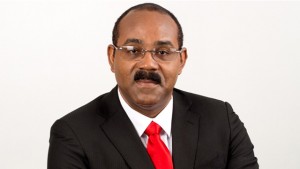The Antigua and Barbuda government says it remains committed to buying out the operations here of the Irish-owned telecommunication company, Digicel, as the authorities announce new initiatives in its ongoing battle to have the two foreign-owned companies share the spectrum space in Antigua and Barbuda with a state-entity.
Last month, Digicel, defended its decision to secure a High Court order preventing the government from sharing any of the 850 MHz spectrum it has been allocated with the state-owned Antigua Public Utilities Authority (APUA).
But speaking on his privately-owned radio station over the last weekend, Prime Minister Gaston Browne said he believes that Digicel “is showing an inclination to have possibly a 49-51 percentage situation.
“That’s the sticking point because we want the majority,” he said, adding that if the Digicel officials are prepared to “look at the possibility APUA…acquiring Digicel Antigua then we may have a deal”.
Earlier, Senior Counsel Anthony Astaphan told radio listeners that the government is moving to amend the Telecommunications Bill so as to provide further protection for APUA.
Astaphan, who is among lawyers representing the state in the court battle, said the government is seeking to provide some level of protection for the only telecommunication company in the Eastern Caribbean, not owned by foreign interests.
“I agree with the position that there should be some protection because I have noticed coming from the Privy Council (Antigua and Barbuda’s final court) that …they accept that Parliament or the government may make decisions to ensure that private enterprises …or public enterprises that are locally owned are not wiped out by international competition.
“So that is something, with the Prime Minister’s specific permission, we will spend the next five to seven days looking at to see how best we can reformulate some of the provisions to give some protection to a local asset which is APUA and not open it up to the extent that they may or may not be unfairly prejudiced by having to comply with certain things,” Astaphan added.
He said the proposed legislation would allow for the authorities to make an order that “spectrum already allocated to a provider should be distributed or shared with somebody else to create an even playing field in the public interest subject only to the condition of compensation…”
Earlier this month, the government said it expects the High Court matter involving the two foreign telecommunications companies objecting to the plan to share the 850 megahertz spectrum with the state-owned utility company to “be heard over several years”.
Digicel said that it had taken the legal action because it wanted to shield its customers from “significant service disruption and a negative impact on coverage.”
Digicel claims that APUA has almost twice as much spectrum as either of the other two operators in the market, despite having less than 25 per cent.
“APUA is hoarding a scarce and valuable resource,” the Digicel said, adding “in any other market, this would be a cause for concern for the regulator, but uniquely in Antigua & Barbuda, APUA is also the Regulator”.

